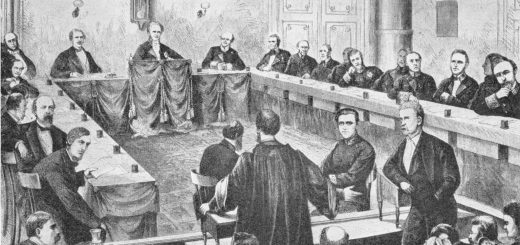The Canadian Citizenship Oath: Exposed
The tide appears to be turning in Mr. Charles Roach’s fifteen year struggle to challenge the requirement that new Canadians pledge allegiance to Queen Elizabeth II. On May 17, 2007, Justice Belobaba from the Ontario Superior Court of Justice gave a green light to a class action suit that Roach is leading, which challenges the constitutionality of a portion of the Canadian Citizenship oath, as it is set out in s. 24 of the Citizenship Act,. R.S.C. 1985 c. C-29. On Feb 19, 2008, the Ontario Court of Appeal dismissed the appeal by the federal government and confirmed that Roach can continue with his class action suit.
Fifteen years ago, the Toronto lawyer was unsuccessful at trial where the judge found no reasonable cause of action. On appeal in 1994, the Federal Court of Canada also struck down Roach’s motion to eliminate the citizenship oath requirement in Roach v. Canada (Minister of State for Multiculturalism and Citizenship) [1994] 2 F.C. 406. MacGuigan J.A. (McDonald J.A concurring )summarized his reasoning as follows:
Given that the appellant did not advocate revolutionary change, that is change contrary to the Constitution itself, his freedom of expression, freedom of peaceful assembly and freedom of association under section 2 of the Charter could not be limited by the oath of allegiance which in no way diminishes the exercise of those freedoms. It was “plain and obvious” and ‘beyond doubt’ that the appellant would have no chance of success at trial in that regard. In arguing that the process to obtain citizenship requires from non-citizens an oath of allegiance to the Queen, which Canadian citizens by birth are not required to take, the appellant made a meaningless comparison of groups. Birth-citizens are not required to take an oath of allegiance because they need not submit to a process to obtain the citizenship they already have.
Linden J.A. dissented in part. He acknowledged that some aspects of the claim were valid, such as the argument that the coerciveness of the impugned law violated freedom of thought, belief and opinion in para 2(b) of the Charter. Other aspects of the claim, however, in particular the infringement of the freedom of conscience, religion and peaceful assembly were struck out. Linden J.A. clarified that “[i]t is only in the most obvious cases that the opportunity to present evidence and full legal argument should be denied a litigant”.
This dissenting voice might have provided further steam for Mr. Roach as he commenced an application under Rule 14.05(3)(g.1) and the Class Proceedings Act 1992, S.O. 1992, c.6 to challenge the constitutionality of that portion of the Canadian citizenship oath. The issue for Mr. Roach has always been that as a requirement for Canadian citizenship, swearing an oath or allegiance “to be faithful and bear true allegiance to Her Majesty the Queen” violates section 2 of the Charter and equality rights under s.15(1) of the Charter. In the current application, Mr. Roach and the applicants are asking for a “declaration to this effect, an injunction restraining the respondent from denying citizenship if the applicants choose not to take this portion of the oath, and a $5000 damages award for each of the members in the class” [3].
One way that the citizenship oath violates section 2 of the Charter is in preventing the applicants from advocating constitutional reform that would eliminate such an “undemocratic vestige of a colonial experience that has no place in a modern and independent Canada” [10]. The applicants believe in a republican form of government and they cannot advocate for this, they say, if they are required to swear an oath to be “faithful and bear true allegiance to Her Majesty the Queen” [11]. The citizenship also arguably violates section 15(1) of the Charter by discriminating “between birth citizens, who are not required to take this oath, and new citizens for whom the oath to the Queen is a pre-condition for citizenship” [12].
Belobaba J. in Roach v. Canada (Secretary of State), (2007) 86 O.R. (3d) 101, concluded that the application should not be struck out because it is not “plain and obvious” and “beyond reasonable doubt” that the action or application is “certain to fail” and has “no chance of success”: Hunt v. Carey Canada Inc., 1990 CanLII 90 (S.C.C.), [1990] 2 S.C.R. 959 (S.C.C.); R.D. Belanger & Assoc. Ltd. v. Stadium Corp. of Ontario Ltd. 1991 CanLII 2731 (ON C.A.), (1991), 5 O.R. (3d) 778 (C.A.)” [15]. In fact, Belobaba J. found that “[t]he possibility that the impugned portion of the citizenship oath may be in violation of sections 2 and 15 of the Charter of Rights has been acknowledged by at least one appellate judge and has been thoughtfully argued by legal commentators: see, for example, the dissenting opinion of Linden J.A. in Roach v. Canada (Minister) and the Charter analysis set out in Edwards, “Let Your Yea be Yea: The Citizenship Oath, the Charter, and the Conscientious Objector” (2002) 60 U.T. Fac. L. Rev. 39” [16].
On a different note, the Attorney General argued that this application amounts to relitigating a case that Mr. Roach had lost in front of the Federal Court of Appeal in 1994 and that this is an abuse of process. Belobaba J. responded to this argument by repositioning the case within the ambit of class proceedings. Mr. Roach is not the only litigant and the other applicants should not be denied the opportunity to bring the same challenge because of an older two-to-one decision on this issue. “And, given that more than fifteen years have passed since the last time this issue was litigated,” Belobaba J. added, “the Charter arguments today will almost certainly be different, or at least more refined [24]”.
The final argument by the Attorney General was that “in the circumstances of this case, this court should decline to hear the matter and yield jurisdiction to the Federal Court” [29]. The reason the respondent cited was because the Federal Court has “exclusive jurisdiction under the Citizenship Act over appeals and other matters pertaining to citizenship, and it has acquired considerable expertise in this area” [30]. However, Belobaba J. reasoned that this case is not an immigration case nor is it a matter involving the “steps taken or not taken by government officials” in their handling of citizenship files. No one is caught up in federal immigration procedures; no one is appealing a denial of citizenship or complaining about delays in the processing of citizenship papers” [32]. This case, according to Belobaba J. is a “straightforward Charter-based constitutional challenge of a federal law.”
Belobaba J. dismissed the motion to stay the application, finding that the case is neither frivolous nor vexatious. The Court of Appeal for Ontario agreed and dismissed a further appeal by the government in Roach v. Canada, 2008 ONCA 124. The importance of this case lies in its symbolism. To a great extent, this case tells the immigrant story from a position of empowerment. The “immigrants” involved in this particular case are exercising agency with respect to an issue that has profound effect on the civic life of all Canadians. This is a narrative in the legal domain that symbolizes many things. This case is a powerful declaration that “permanent residents” can respect the law and challenge it in the proper arena, but not necessarily abide by what might be considered hypocritical requirements placed upon them in a free and democratic society.
This case is also unique because it involves the litigation of section 2 of the Charter rights by “non-citizens” (and “citizens” who were coerced into taking the oath) outside the ambit of immigration law. At an immediate level, this case exemplifies how the Charter can be put to use by “non-citizens”. Beyond the surface though, this case is about the Canadian identity and its intimate connection to the histories of its inhabitants. The issues raised by Mr. Roach’s challenge are ground breaking and should be considered by all Canadians, judges or not.








Join the conversation